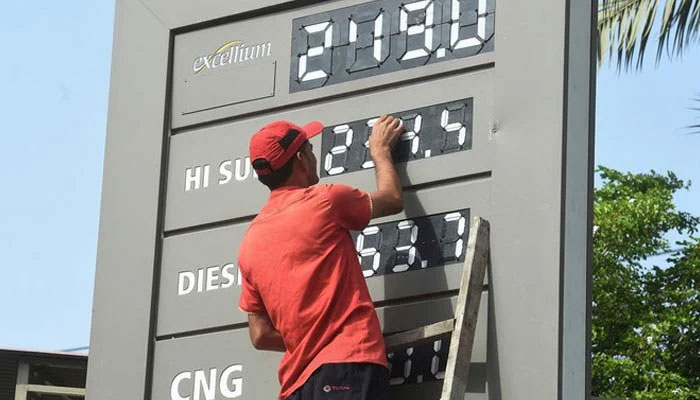Petroleum products prices seen jumping post rupee devaluation
KARACHI: Petroleum prices would increase massively in the next fortnightly review, even without a spike in levy and sales tax, as the government aims to please the International Monetary Fund (IMF), The News learnt on Friday.
Information gathered from the country’s oil sector showed that the massive depreciation of rupee against the dollar in the last two sessions would not reflect greatly in the review due on January 31, 2023, as the average exchange rate would come around Rs240. However, the fortnightly review due on February 15 would show sharp appreciation in domestic petroleum prices on account of rupee depreciation.
“The sharp appreciation of dollar against the rupee in the last two sessions would reflect in the revision of petroleum prices on February 15, 2023 when the dollar rate calculation would start from Rs260,” people in the oil industry noted.
In the upcoming fortnightly review, the sharp increase in the price of diesel and petrol would be caused by free on board (FOB) prices.
Those privy to the matter said that diesel price would likely jump up by Rs25 in the next fortnightly review if calculated on FOB. The exchange rate would create some hike, but not so much, they said. They attributed the hike to FOB as diesel price in the international market went up to $117/barrel compared to $114/barrel.
If government increased the petroleum levy (PL) to Rs50/litre on diesel, which seems likely to meet the IMF condition, the price could jump further and the GST inclusion even on 10 percent would be pushing the price much higher, they added.
Petrol price hike on FOB basis would likely be around Rs20-21. The government has been charging Rs50/litre PL on petrol and slapping of even 10 percent GST would be costing the consumers dearly in the coming fortnightly review of prices. The price of petrol in the international market jumped to $97/barrel compared to $93/barrel during the previous fortnight.
Oil industry believed that the government would likely increase the PL on diesel to meet the IMF conditions, otherwise it would not have allowed free-float of exchange rate. The government’s decision to remove the cap on exchange rate parity resulted in massive appreciation of dollar against the domestic unit in two consecutive sessions on Thursday and Friday. The rupee on Friday recorded a new low against the US dollar, closing at Rs262.60, down 2.73 percent day-on-day. This also raised alarms on a new wave of inflation in the country.
However, oil industry sources admitted that although the government was hesitant on increasing GST on petroleum prices, which would cost it heavily in political terms, petroleum prices were set to increase in the upcoming fortnight. They added that the price hikes might become even more drastic in the next fortnightly review, due on February 15, 2023.
-
 ChatGPT Caricature Prompts Are Going Viral. Here’s List You Must Try
ChatGPT Caricature Prompts Are Going Viral. Here’s List You Must Try -
 James Pearce Jr. Arrested In Florida After Alleged Domestic Dispute, Falcons Respond
James Pearce Jr. Arrested In Florida After Alleged Domestic Dispute, Falcons Respond -
 Cavaliers Vs Kings: James Harden Shines Late In Cleveland Debut Win
Cavaliers Vs Kings: James Harden Shines Late In Cleveland Debut Win -
 2026 Winter Olympics Snowboarding: Su Yiming Wins Bronze And Completes Medal Set
2026 Winter Olympics Snowboarding: Su Yiming Wins Bronze And Completes Medal Set -
 Trump Hosts Honduran President Nasry Asfura At Mar-a-Lago To Discuss Trade, Security
Trump Hosts Honduran President Nasry Asfura At Mar-a-Lago To Discuss Trade, Security -
 Cuba-Canada Travel Advisory Raises Concerns As Visitor Numbers Decline
Cuba-Canada Travel Advisory Raises Concerns As Visitor Numbers Decline -
 Anthropic Buys 'Super Bowl' Ads To Slam OpenAI’s ChatGPT Ad Strategy
Anthropic Buys 'Super Bowl' Ads To Slam OpenAI’s ChatGPT Ad Strategy -
 Prevent Cancer With These Simple Lifestyle Changes
Prevent Cancer With These Simple Lifestyle Changes -
 Air Canada Flight Diverted St John's With 368 Passengers After Onboard Incident
Air Canada Flight Diverted St John's With 368 Passengers After Onboard Incident -
 Experts Reveal Keto Diet As Key To Treating Depression
Experts Reveal Keto Diet As Key To Treating Depression -
 Inter Miami Vs Barcelona SC Recap As Messi Shines With Goal And Assist
Inter Miami Vs Barcelona SC Recap As Messi Shines With Goal And Assist -
 David Beckham Pays Tribute To Estranged Son Brooklyn Amid Ongoing Family Rift
David Beckham Pays Tribute To Estranged Son Brooklyn Amid Ongoing Family Rift -
 Jailton Almeida Speaks Out After UFC Controversy And Short Notice Fight Booking
Jailton Almeida Speaks Out After UFC Controversy And Short Notice Fight Booking -
 Extreme Cold Warning Issued As Blizzard Hits Southern Ontario Including Toronto
Extreme Cold Warning Issued As Blizzard Hits Southern Ontario Including Toronto -
 Lana Del Rey Announces New Single Co-written With Husband Jeremy Dufrene
Lana Del Rey Announces New Single Co-written With Husband Jeremy Dufrene -
 Ukraine-Russia Talks Heat Up As Zelenskyy Warns Of US Pressure Before Elections
Ukraine-Russia Talks Heat Up As Zelenskyy Warns Of US Pressure Before Elections




